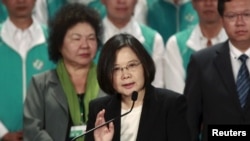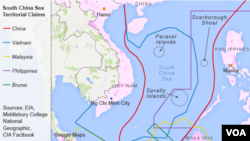The frontrunner in Taiwan’s presidential race is proposing to talk with the countries involved in an old maritime dispute that has become a potential military flashpoint in East Asia. Her approach could throw Taiwan further into a fray after decades on the sidelines.
Tsai Ing-wen told a group of foreign diplomats Tuesday that, if elected, she will pursue dialogue with Brunei, China, Malaysia, Vietnam and the Philippines, each of which claim all or parts of the South China Sea.
Each has a stake in the 3.5 million-square-kilometer sea that is rich in fisheries, commercial shipping lanes and possibly fossil fuel reserves. Taiwan holds two islets in the Spratly archipelago, surrounded by the bigger holdings of China, Malaysia and Vietnam.
China, the regional giant, has raised regional tensions by occupying and building on once uninhabitable islets and positioning oil rigs offshore. Tsai said diplomacy is the key to resolving the dispute.
"We will actively work to reduce tensions in regional flashpoints, such as the South China Sea, where confrontation is threatening to roll-back decades of peaceful relations in the region," she promised, adding "We are ready to engage in dialogue with different parties with the purpose of finding a diplomatic solution."
Proposed peace plan
In May, Taiwan's current president, Ma Ying-jeou, proposed a peace plan under which the other governments set aside sovereignty disputes and work jointly on resource exploration.
But political realities have proven how difficult it is to find a diplomatic solution. President Ma must step down next year due to term limits. And so far, none of the claimants have agreed to the peace plan.
China claims sovereignty over Taiwan, and has demanded that the other claimants, as diplomatic allies of Beijing, avoid talking to Taipei.
Talks with other South China Sea claimants could be conducted through trade and cultural offices that Taiwan has established with most major countries. Those offices lack formal diplomatic status but are staffed by foreign governments.
If the other claimants agreed to talk with Taiwan despite China, such dialogue could test Taipei's relations in Asia.
Trade and investment ties with China forged since 2008 would be threatened, and the Southeast Asian maritime claimants may ask Taiwan to sign codes of conduct that now exempt it for lack of diplomatic relations. The Taiwanese government is also keen to improve ties with China.





